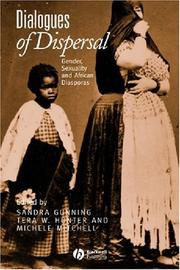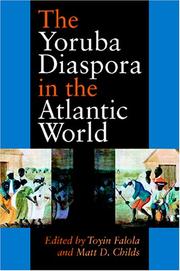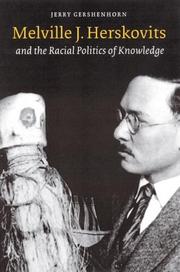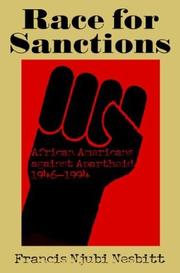| Listing 1 - 5 of 5 |
Sort by
|

ISBN: 1405126817 Year: 2004 Volume: *2 Publisher: Blackwell,
Abstract | Keywords | Export | Availability | Bookmark
 Loading...
Loading...Choose an application
- Reference Manager
- EndNote
- RefWorks (Direct export to RefWorks)
African diaspora --- Afrikaanse diaspora --- Black diaspora --- Comportement selon le sexe --- Diaspora [Afrikaanse ] --- Diaspora africaine --- Gender role --- Rolpatronen [Seksuele ] --- Rôle selon le sexe --- Rôles féminins --- Rôles masculins --- Rôles sexuels --- Seksuele rolpatronen --- Sex role --- Sexe [Rôle selon le ] --- Subordination of women --- Blacks --- Sexual behavior --- Social life and customs --- DIASPORA AFRICAINE --- ROLE SELON LE SEXE --- NOIRS --- SEXUALITE --- MOEURS ET COUTUMES

ISBN: 0253344581 0253217164 9780253003010 0253003016 9780253344588 9780253217165 Year: 2004 Publisher: Bloomington Indiana University Press
Abstract | Keywords | Export | Availability | Bookmark
 Loading...
Loading...Choose an application
- Reference Manager
- EndNote
- RefWorks (Direct export to RefWorks)
This innovative anthology focuses on the enslavement, middle passage, American experience, and return to Africa of a single cultural group, the Yoruba. Moving beyond descriptions of generic African experiences, this anthology will allow students to trace the experiences of one cultural group throughout the cycle of the slave experience in the Americas. The 19 essays, employing a variety of disciplinary perspectives, provide a detailed study of how the Yoruba were integrated into the Atlantic world through the slave trade and slavery, the transformations of Yoruba identities and culture, and the strategies for resistance employed by the Yoruba in the New World.The contributors are Augustine H. Agwuele, Christine Ayorinde, Matt D. Childs, Gibril R. Cole, David Eltis, Toyin Falola, C. Magbaily Fyle, Rosalyn Howard, Robin Law, Babatunde Lawal, Russell Lohse, Paul E. Lovejoy, Beatriz G. Mamigonian, Robin Moore, Ann O'Hear, Luis Nicolau Parés, Michele Reid, João José Reis, Kevin Roberts, and Mariza de Carvalho Soares.Blacks in the Diaspora--Claude A. Clegg III, editorDarlene Clark Hine, David Barry Gaspar, and John McCluskey, founding editors
Yoruba (African people) --- Slavery --- Return migration --- African diaspora. --- Yorouba (Peuple d'Afrique) --- Esclavage --- Migration de retour --- Africains --- History --- History. --- Histoire --- African diaspora --- Yariba (African people) --- Yooba (African people) --- Yorubas --- Ethnology --- Migration, Return --- Emigration and immigration --- Repatriation --- Black diaspora --- Diaspora, African --- Human geography --- Africans --- Migrations --- Transatlantic slave trade --- YORUBA (AFRICAN PEOPLE) --- SLAVERY --- AFRICAN DIASPORA --- SOCIAL SCIENCE --- HISTORY --- Yoruba (African People) --- African Diaspora --- Social Science

ISBN: 1280424117 9786610424115 0803203950 9780803203952 0803221878 9780803221871 9781280424113 661042411X Year: 2004 Publisher: Lincoln University of Nebraska Press
Abstract | Keywords | Export | Availability | Bookmark
 Loading...
Loading...Choose an application
- Reference Manager
- EndNote
- RefWorks (Direct export to RefWorks)
"Melville J. Herskovits and the Racial Politics of Knowledge is the first full-scale biography of the trailblazing anthropologist of African and African American cultures. Born into a world of racial hierarchy, Melville J. Herskovits (1895-1963) employed physical anthropology and ethnographyy to undermine racist and hierarchical ways of thinking about humanity and to underscore the value of cultural diversity. His research in West Africa, the West Indies, and South America documented the far-reaching influence of African cultures in the Americas. He founded the first major interdisciplinary American program in African studies in 1948 at Northwestern University, and his controversial classic The Myth of the Negro past delineated African cultural influences on American blacks and showcased the vibrancy of African American culture. He also helped forge the concept of cultural relativism, particularly in his book Man and His Works. While Herskovits promoted African and African American studies, he criticized some activist black scholars, most notably Carter G. Woodson and W.E.B. Du Bois, whom he considered propagandists because of their social reform orientation." "After World War II, Herskovits became an outspoken public figure, advocating African independence and attacking American policymakers who treated Africa as an object of Cold War strategy. Drawing extensively on Herskovits's private papers and published works, Jerry Gershenhorn's biography recognizes Herskovits's many contributions and discusses the complex consequences of his conclusions, methodologies, and relations with African American scholars."--Jacket.
Self-determination, National --- African diaspora. --- Cultural relativism --- Racism in anthropology --- African Americans --- Anthropologists --- National self-determination --- Nationalism --- Nation-state --- Nationalities, Principle of --- Sovereignty --- Black diaspora --- Diaspora, African --- Human geography --- Africans --- Relativism, Cultural --- Ethnology --- Ethnopsychology --- Relativity --- Anthropology --- Scientists --- Social life and customs. --- Anthropometry. --- Migrations --- Herskovits, Melville J. --- Africa, West --- Transatlantic slave trade

ISBN: 1282072463 9786612072468 0253110688 9780253110688 0253342325 9780253342324 Year: 2004 Publisher: Bloomington : Indiana University Press,
Abstract | Keywords | Export | Availability | Bookmark
 Loading...
Loading...Choose an application
- Reference Manager
- EndNote
- RefWorks (Direct export to RefWorks)
""An important contribution to the political history of this period [and] a must for those interested in the influence of the great pan-Africanists."" -- Elliott P. Skinner This study traces the evolution of the anti-apartheid movement from its origins in the 1940's through the civil rights and black power eras to its maturation in the 1980's as a force that transformed U.S. foreign policy. The movement initially met resistance and was soon repressed, only to reemerge during the civil rights
Economic sanctions, American --- Anti-apartheid movements --- African diaspora. --- African Americans --- American economic sanctions --- Civil rights movements --- Apartheid --- Black diaspora --- Diaspora, African --- Human geography --- Africans --- History --- Politics and government --- Migrations --- United States --- South Africa --- Foreign relations --- 20th century --- African diaspora --- Economic sanctions [American ] --- Transatlantic slave trade

ISBN: 0822332884 0822332116 Year: 2004 Publisher: Durham London : Duke University Press,
Abstract | Keywords | Export | Availability | Bookmark
 Loading...
Loading...Choose an application
- Reference Manager
- EndNote
- RefWorks (Direct export to RefWorks)
Becoming Black is a powerful theorization of Black subjectivity throughout the African diaspora. In this unique comparative study, Michelle M. Wright discusses the commonalties and differences in how Black writers and thinkers from the United States, the Caribbean, Africa, France, Great Britain, and Germany have responded to white European and American claims about Black consciousness. As Wright traces more than a century of debate on Black subjectivity between intellectuals of African descent and white philosophers, she also highlights how feminist writers have challenged patriarchal theories of Black identity. Wright argues that three nineteenth-century American and European works addressing race-Thomas Jefferson's Notes on the State of Virginia, G. W. F. Hegel's Philosophy of History, and Count Arthur de Gobineau's Essay on the Inequality of the Human Races-were particularly influential in shaping twentieth-century ideas about Black subjectivity. She considers these treatises in depth and describes how the revolutionary Black thinkers W. E. B. Du Bois, Aimé Césaire, Léopold Sédar Senghor, and Frantz Fanon countered the theories they promulgated. She explains that while Du Bois, Césaire, Senghor, and Fanon rejected the racist ideologies of Jefferson, Hegel, and Gobineau, for the most part they did so within what remained a nationalist, patriarchal framework. Such persistent nationalist and sexist ideologies were later subverted, Wright shows, in the work of Black women writers including Carolyn Rodgers and Audre Lorde and, more recently, the British novelists Joan Riley, Naomi King, Jo Hodges, and Andrea Levy. By considering diasporic writing ranging from Du Bois to Lorde to the contemporary African novelists Simon Njami and Daniel Biyaoula, Wright reveals Black subjectivity as rich, varied, and always evolving.
Blacks --- Identity (Psychology) --- African diaspora. --- Noirs --- Identité (Psychologie) --- Africains --- Race identity. --- Identité ethnique --- Identité (Psychologie) --- Identité ethnique --- African diaspora --- Personal identity --- Personality --- Self --- Ego (Psychology) --- Individuality --- Black identity --- Blackness (Race identity) --- Negritude --- Race identity of blacks --- Racial identity of blacks --- Ethnicity --- Race awareness --- Black diaspora --- Diaspora, African --- Human geography --- Africans --- Race identity --- Migrations --- Race identity of Black people --- Racial identity of Black people --- Black persons --- Negroes --- Ethnology --- Black people --- Transatlantic slave trade --- Identité (psychologie) --- À l'étranger
| Listing 1 - 5 of 5 |
Sort by
|

 Search
Search Feedback
Feedback About
About Help
Help News
News